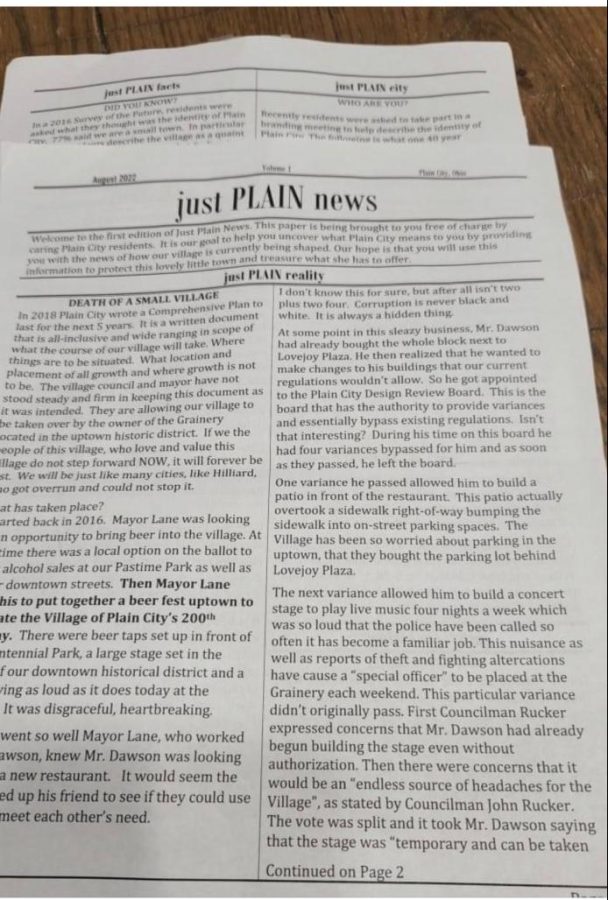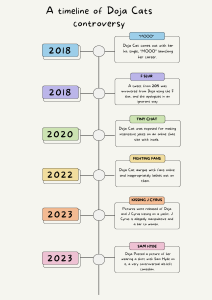Anonymous newsletter circulates Plain City
A portion of the first newsletter released back in August 2022.
March 16, 2023
As you’re filing through your stack of mail, you notice a piece of paper held closed with a piece of Scotch tape. No address, no name — just a folded piece of paper. How and why did this get here?
Starting in August 2022, Plain City residents sporadically began receiving an anonymous “newsletter” about the town. The letter is noted as more of a gossip column by residents, as it’s being credited as less news and more about what the writer views as the problems with Plain City, specifically the Grainery, owned by Tim Dawson.
Main Street Treasures employee Luro Swick has lived in Plain City since 1995 and has worked on Main Street for 11 years. Swick’s initial reaction to receiving the newsletter showed concerns about how it got there.
“Who’s doing this? I mean, there’s no reference to who put it out there, and I’ve only gotten one [of the letters].”
One thing people have noticed is the inconsistency of the newsletter. Kerri Ferguson, one of the co-owners of Main Street Treasures, has lived in Plain City for almost 19 years. Ferguson is concerned about the inconsistency of the newsletter.
“You don’t know when the next one is going to show up. It could be two weeks or it could be two months.”
Ferguson has been around other Plain City business owners for over a decade and has a good understanding of the business community. She says something like this [the anonymous paper] has happened in the past and again, with no one willing to put their name to it. Ferguson believes anonymous news like this is ultimately harming the community of Plain City.
“Sadly, I think it creates discourse in your community. It’s hard to address because you don’t quite know who the source is,” she says.
Ferguson says it’s her job as a reader to fact-check information and not simply read it and believe it. She also says that there are components of the letter that make it difficult for her to believe anything being said about the local issues.
Ferguson’s ultimate belief is that everyone has a right to share and say what they want to say, but that the anonymous component of the letter makes it much less legitimate for her.
“If you’re not willing to sign your name to your words, I doubt the integrity of what somebody’s trying to say. If it’s important to you and you want it to be your words then you should put your name on the document.”
Ferguson adds that it’s evident by glancing at the paper that it hasn’t been proofread or edited. This contributes to her skepticism about the letters.
“It’s also just not proofread, and it’s hard to have legitimacy to something that has not been edited and has not been proofread.”
Main Street Treasures has a good working relationship with Dawson, as he’s their landlord. From a business standpoint, Ferguson believes it’s difficult to navigate the situation of being a target of someone’s words, no matter the platform. Her ultimate hope is that customers will ask Dawson himself about the statements if they have concerns about what’s being said in the letter and straighten out the facts.
“It’s really hard to deal with [being a target]. We’ve had limited conversations about it, and usually, you know, we’ve just offered support to validate other people’s thoughts.”
Ferguson also believes that the lack of communication between the working relationships and residents of Plain City is part of the issue. Ferguson talks about how residents aren’t usually informed about the actions taking place behind the scenes, which would be helpful to know about.
“There are a lot of things going on behind the scenes; remedies are talked about that are not necessarily communicated in this particular news,” she says.
Ferguson talks about how the fading of newspapers is leading to a decline in readership among people, even beyond the borders of Plain City. The lack of access to information is leaving people to believe what they hear via word of mouth or social media.
“It’s a challenge for all communities to get the word out about what’s really going on. Unfortunately, I think even on a national level, we see people who don’t have access to factual information. It’s tough because everyone views it differently. There’s no right or wrong.”









